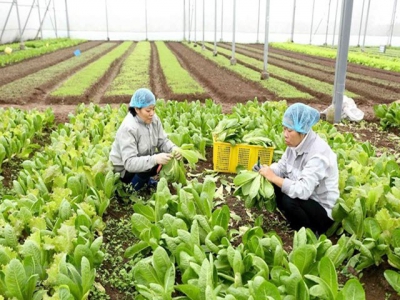More investment in processing key to boost fruit, vegetable export

Ho Chi Minh City (VNA) – More investment in processing and post-harvest preservation is needed to create added value for the export of fruit and vegetable products, experts said at a forum on the fruit and vegetable industry in HCM City on March 13.
A safe vegetable production establishment in Hanoi (Source: VNA)
General Secretary of the Vietnam Fruit and Vegetable Association Dang Phuc Nguyen said the main problem of the sector is the slow pace of mechanisation and lack of technologies in post harvest preservation and processing, resulting in huge post-harvest losses and the degradation of product quality during the distribution process.
He noted that there are just nearly 150 firms operating in fruit and vegetable processing in the country.
Besides raising the added value for products, cutting production and transport costs is a solution to enhance the competitiveness of domestic fruit and vegetable.
Le Van Duc, deputy director of the Department of Cultivation under the Ministry of Agriculture and Rural Development, pointed to the small scale of production, which he said is the cause of uneven quality of products.
Participants also urged building brands and geographical indications for local and regional specialties.
The forum agreed that while export opportunities are abound for the country’s fruit and vegetable, synchronous actions are needed to ensure sustainable growth for the sector.
Last year, the export of fruit, vegetables and flower earned Vietnam 3.8 billion USD, an annual rise of 8.9 percent. With more than 1.8 million hectares of land dedicated for the cultivation of those plants, Vietnam aims for 5 billion USD of revenues from the products in 2020.
Có thể bạn quan tâm
 Organic farming: a commercial farmer converts
Organic farming: a commercial farmer converts Peter Nicholson of Roselands farm near Richmond in KwaZulu-Natal believes organic farming can be used to sustainably feed the world.
 New gene cloning method may speed development of rust-resistant crops
New gene cloning method may speed development of rust-resistant crops Disease resistance genes from wild relatives could be used to engineer broad-spectrum resistance in domesticated crops.
 Vegetable crops improve wheat yield
Vegetable crops improve wheat yield Many small-grain farmers in the Southern Cape have added brassicas in the form of canola to their crop rotation programmes.